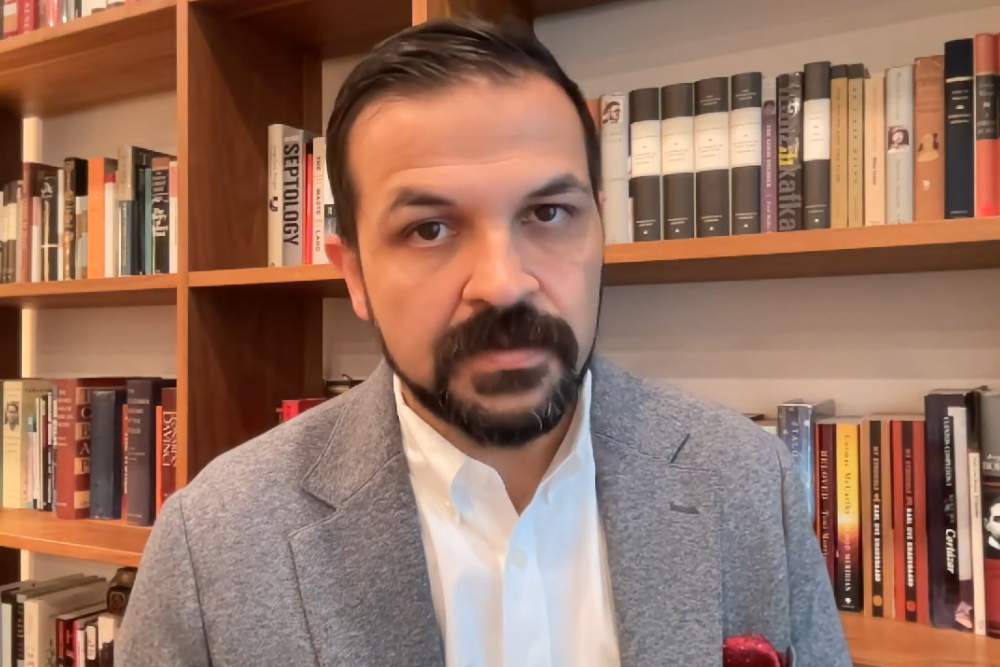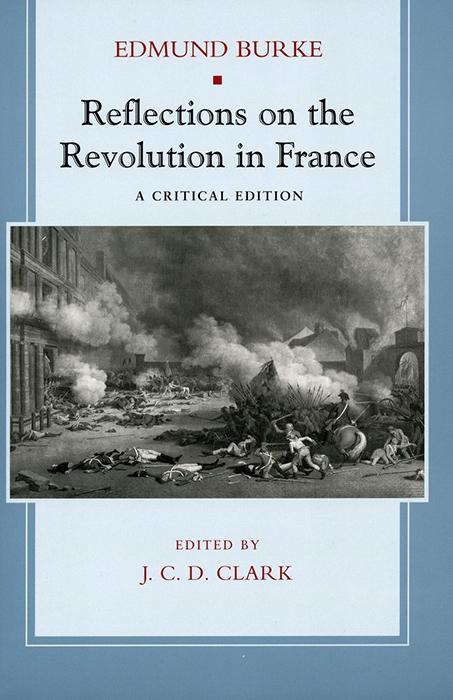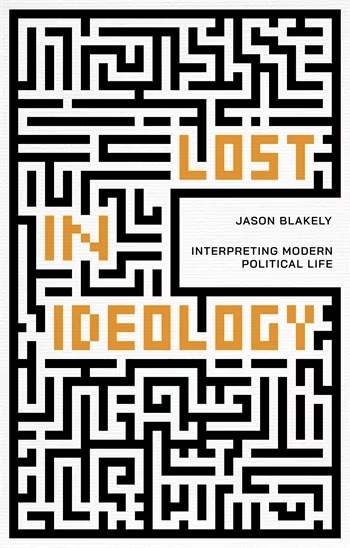
Jason Blakely is pictured in a screenshot from a video about his book Lost in Ideology: Interpreting Modern Political Life. (NCR screenshot/YouTube/Jason W Blakely)
Friday, I began my examination of Jason Blakely's book Lost in Ideology: Interpreting Modern Political Life, focusing on his method and the first ideology he examines, classical liberalism. Today, I will look briefly at some of the other ideologies he considers and do a deep dive on one that holds special attraction, and therefore a capacity for self-deception, for Roman Catholics.
After examining classical liberalism, Blakely turns his gaze to two other map-making approaches that were present at, or even before, the American founding, civic republicanism and white supremacy. The former he describes as "a communal and participatory form of democracy" which still inspires partisans of both left and right. White supremacy was "a hierarchical racial politics … that erected several caste systems domestically and wove itself into later fascist movements across the globe."
Blakely then reminds the reader why this book is vitally important: "Both of these ideologies continue to mix and blend in complex ways with other maps, including not only liberalism but also conservatism, nationalism, ecologism, and more. To fail to decode their symbols is to remain blind to the persistent ideological multiplicity of contemporary life." His examination of these ideas, and of the social norms they reflect and embed, is fascinating.
Next, Blakely considers two 20th-century transformations of the liberal tradition, the emergence of progressivism or "social liberalism" and of right libertarianism. He is keen to note that both these iterations inherit a great deal from the liberalism of John Locke, but the social liberal seeks to extend the idea of rights beyond formal, political rights and into the social and economic sphere, while right libertarianism argues the governmental architecture needed to enact the progressive's expansion of rights entails more coercive government than liberalism should permit. Blakely instructively notes that "the intense rivalry between progressives and right libertarians is partly due to the fact that each shares some kinship with the classical liberal past." And, as in his treatment of classical and utilitarian liberalism, Blakely is generous as well as critical.
Conservatism is the next ideology to be placed under Blakely's microscope and it warrants additional attention in this review because it is, for a variety of historical and philosophical reasons, closely aligned with dominant Catholic ideas about the polity.
"Conservatism is a cultural map foregrounding traditional society as worthy of veneration and defence against waves of avant-gardism and modernizing change. … Recurrent themes of conservative ideology include: sacred tradition, time-tested folkways, conventional morality, inherited authority, a critique of rationalism in politics, the need for prudence, and a call for cautious and incremental change," he begins.
There has always been an uneasy tension in conservatism, that dates from its beginnings in the late 18th century. It wants to hold on to the world that is slipping away even while it must do so in real-time, reacting to the prompts (understood by conservatives as assaults) of modernity. As Blakely writes, "The defence of tradition inaugurates conservatism as a distinctly modern map that belongs to the age of ideologies."

"Edmund Burke Esq.," 1770 work by James Watson (Wikimedia Commons/Yale Center for British Art)
There is a sense in which almost all of American political discourse before World War II was an intramural struggle within liberalism. In the postwar era, some of conservatism ventures beyond the liberal worldview and retrieves the ideas and insights of Edmund Burke. Blakely writes of the Irish-born statesman, "For Burke, a tradition is an inherited and unitary culture that comprises a society's way of life — from language to the arts, religion to law. It is no exaggeration to say that, for Burke, humans are traditionary creatures. … Tradition creates the field of action and various social roles that comprise human identity."
For Catholics, I would note, tradition plays a similar role but its authority is not rooted in the mists of history but in the transhistorical quality of divine revelation. The inheritance is one of grace, not blood and the difference is important. "Fiunt, non nascuntur, Christiani" wrote Tertullian. Christians are made, not born. Indeed, those who conflate tradition in the political sense with tradition in the religious sense often unintentionally erase the necessity of grace and conversion from the equation. As Blakely poignantly observes, "The liquidity of ideologies allows them to sometimes absorb and co-opt an older religious tradition in its entirety. When this happens, religion continues to exist like the lost city of Atlantis, submerged at the bottom of an ideological ocean."
There are many and obvious attractions to conservatism, not least the check it places on political authority. "Tradition constrains and tempers every living authority's decision-making power," Blakely writes. "Political sovereignty is not absolute because it is answerable to the past. Inherited tradition and morality set down limits on present action." He comments, as well, on "another ethical allure of conservative ideology: a sense of sober and realistic expectations."
Having presented a sympathetic sketch of conservatism, Blakely subjects it, as he did liberalism, to his sometimes withering analysis. He writes that Burke's "thinking neglects the problem that traditions themselves (whether ideological, religious, linguistic, aesthetic, and so on) are always subject to rival interpretations, developments and breaks. Traditions do not arrive as monolithic and unitary, but as fluid and contestable."

Edmund Burke's Reflections on the Revolution in France
Blakely goes on to examine some later iterations of conservative ideology, such as those he terms Cold War fusionists, to American pastoralists, a group that will inspire another ideology examined later in the book, ecological ideology. This points to two of the book's most important insights: first, there is no one iteration of liberalism or conservatism, but many iterations and, second, that the boundaries between ideologies are exceedingly porous, and every ideology borrows from the others and even acquires some of its opponents' attributes in the process of articulating an opposition.
This last point is especially relevant when Blakely turns to socialism which is both a reaction to classical liberalism and a vehicle for progressive politics, the kind of hybridization of ideologies that Blakely's cultural analysis explains and highlights. And, his approach is essential when he considers fascism. Unlike liberalism with Locke's Second Treatise, conservatism with Burke's Reflections on the Revolution in France, and socialism with Marx and Engels' Capital, fascism has no urtext to guide and shape the movement, making it even more likely to almost spontaneously adopt items from other, even opposing, ideological programs if it helps in the moment:
Fascism often befuddles contemporary people as it appears disguised and diluted by more familiar ideological traditions than those typical of the classical, twentieth-century fascisms of Hitler's Germany and Mussolini's Italy. But the Western democracies have for some time been busy incubating their own homegrown fascist varietals. If these are less obvious than the original fascisms, it is only because the cultural fusions in which they participate have become head-spinning in their eclecticism.
And he correctly notes what is, in the United States, a key ingredient in fascism's appeal: "Fascist politics provides what appears to its followers as a potent antidote to a modern crisis of spiritual homelessness and nihilism." Fascism may critique rationalism and traffic in romantic ideas of blood and soil, but it is a mistake to think that it is irrational. It corresponds to a need other ideologies have failed to address.
Advertisement
Blakely turns his attention to nationalism, multiculturalism, feminism and ecological politics, and the taxonomy he provides of these ideological movements is very helpful in understanding their appeal and their limits. His discussion of the differences between ethnic and civic nationalisms was especially relevant to this year's political campaign, but these chapters are filled with ideas and insights that shed light on the times in which we are living.
These individual insights, important and keen though they are, pale by comparison to his central insight: We all use ideologies in one way or another to make sense of our world, and we need to find ways to discuss that world with people who possess different ideological reference points.
For the millions of people who are currently lost in ideology, political debate within opponents often consists of little more than bald assertions, condescension, haughtiness and moralizing. From deep inside a particular map, it appears self-evident that the world is necessarily "thus and so." Anyone unable to see by the blinding light of one's own ideological sun is benighted, irrational, wicked or otherwise false.
The success or failure of the American experiment in democracy may depend more on our ability to transcend these ideological blinders than on the insights of any one of them, even liberalism. And Blakely correctly adds that "empiricist political science only exacerbates this situation" by reducing "political convictions to a mere act of the will, an irrational leap towards a given worldview." The appearance of ethical neutrality the political scientists claim is "an illusion." His conclusions, in a short chapter at the end of the book, help sketch a path through the Scylla of relativism and the Charybdis of ideologically driven orthodoxies. One of my favorite passages in the book is this from that concluding chapter: "All the existing ideologies suffer from deep cuts. This does not render them all equal. Rather, the work of objectivity is comparative — requiring patient criticism and moving back and forth between rivals to see which ideology is more successful on the whole. Imagination and sense-making skills are essential." The comparative work is on display on every page of this book.
It is always wrong to criticize an author for failing to write the book one wants to read. That said, I would hope that in his future writings, Blakely will help examine the habits of mind and culture which help poor striving humanity keep from the worst temptations these ideologies pose. That is to say, it is one thing to be motivated by an ideology, but when we call someone an "ideologue" we speak to a cast of mind. For example, Catholic social teaching holds up the adjective "integral" as necessary to its understanding of societal problems and solutions. How to keep an attentiveness to that important adjective from lapsing into the calcified, and dangerous, noun "integralism"?
It would also be fascinating to see Blakely take on one or two particularly interesting ideological founders, say, Burke and Madison or Marx and Mary Wollstonecraft, and examine how their biographies shape their ideological production. Does Blakely agree with the organizing thesis of Conor Cruise O'Brien's magnificent biography of Burke, The Great Melody — that Burke was motivated by a detestation of tyranny in the three defining battles of his life: the impeachment of Warren Hastings, the defense of the American colonists and the opposition to the French Revolution — and, if he does, how does that thesis shape and contradict and expand his understanding of Burke as the founder of vibrant ideology?
Again, these are not criticisms, just encouragements. Blakely is a young man with many productive years of scholarship ahead of him. At a time when academia is in crisis, and many academics are busily chasing fads, here is a bright light. We all have our pantheon of great thinkers to whom we turn and on whom we rely, people who are not just smart but at another level. With this volume, Blakely enters my pantheon, and I am betting many, many others will feel the same.
Editor's note: This is Part 2 of Michael Sean Winters' review of Jason Blakely's book Lost in Ideology. You can read Part 1 here.









